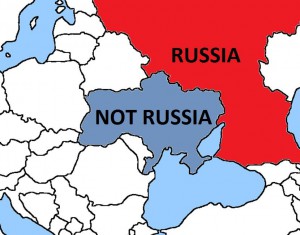 As the fighting in Ukraine intensifies, we often hear Russia’s complaint: that the West, gloating over its “victory” at the end of the Cold War, is encircling Russia and is imposing its will upon the country.
As the fighting in Ukraine intensifies, we often hear Russia’s complaint: that the West, gloating over its “victory” at the end of the Cold War, is encircling Russia and is imposing its will upon the country.
But then the other day, I was reading another piece of news about a planned G7 meeting and it hit me. Imposing its will? Nonsense. The West welcomed Russia. It accepted Russia as a full-fledged member of the international community. It even made Russia a member of the G8, for crying out loud.
But this was not good enough for Mr. Putin’s Russia. Being a member of the international community means accepting its rules (even when you are the United States of America, much to the chagrin of that country’s politicians, especially its conservative lawmakers.)
There was also a deep-seated suspicion that if the West gains from this relationship, Russia must be losing something. As George W. Bush remarked recently, for Mr. Putin politics is a zero-sum game. A very tangible something appeared to be the loss of control over the “near abroad”, especially former Soviet member states. The state of the Baltic countries may be a fait accompli, but a line has to be drawn somewhere… and it appears it has, and it now includes Ukraine.
After all, Mr. Putin declared more than once in the past that he viewed the collapse of the Soviet Union the greatest political disaster of the 20th century. If you are the strongman of a nuclear superpower and thus have the means to do something about it, what would you do about the greatest political disaster? Try to undo it, no?
So in the second decade of the 21st century, Mr. Putin embarked on a decidedly 19th century style pursuit, as he is trying to bend Ukraine to his will. It’s not an open war just yet (Russia claims it’s not involved; if freedom-loving Russian soldiers spend their leave in Ukraine, that’s nobody’s business) but it’s getting close, especially as the West ponders providing arms to the government in Kyiv.
And very rapidly, we find ourselves in a geopolitical situation that is just as scary, if not scarier, than the worst moments of the Cold War. Mr. Putin enjoys tremendous support at home thanks to his nationalistic agenda, which sadly resonates all too well in those parts of the world. Abroad, he reminded us that he commands the strike capability of a nuclear superpower, so it is a very bad idea to mess with him. And the nationalist beast is a hungry one, which requires constant feeding. What next, after Ukraine? Another attempt at a “hybrid war” (of destabilization, irregular troops), this time in NATO’s Baltic member states? What if this provokes a decisive NATO response, in accordance with the NATO charter? Mushroom clouds over battlefields, followed by mushroom clouds over cities?
Last year, we commemorated the 100th anniversary of the start of the War to End All Wars. Maybe we (along with Mr. Putin and his supporters) ought to be reminded that the next world war will likely be the war to end all wars, albeit for the wrong reasons: it will end all wars not because we lose the appetite for bloodshed, but because nobody is left alive to fight.
Or worse yet, maybe this war will be won by our machines.
Anyone with a time machine, please let me know if my wife, our cats and I can get a free ride back to the 1960s…